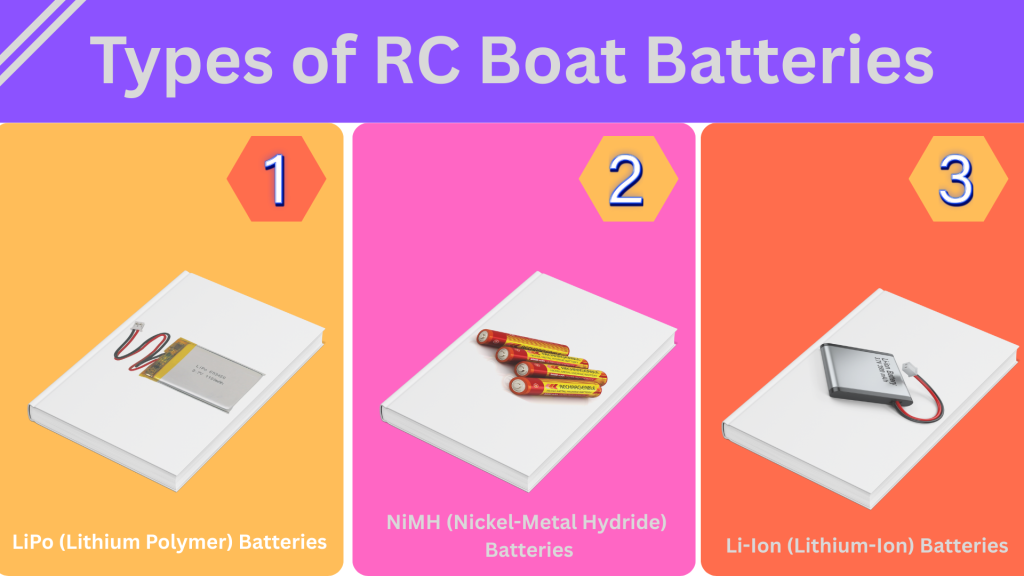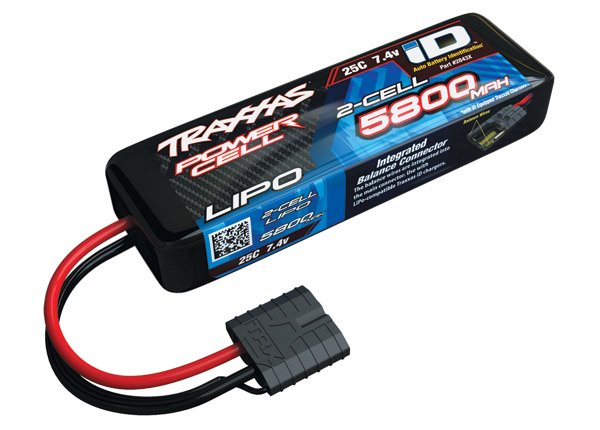In the RC Boat performance battery plays an important role as it has direct effects on speed, power, run time, reliability, safety, and general compatibility.
While a weak battery will decrease speed, shorten run time, create poor acceleration, and lead to overheating. All these negatively
impact your RC boat performance making it an annoying and unpleasant experience.
This guide will discuss the importance of choosing the right battery for different RC boat types, explain specifications of battery (mAh, voltage, discharge rate), compare battery chemistries (LiPo vs. NiMH), and offer tips to extend battery life and performance on the water.
Types of RC Boats
1. Racing Boats: Racing boats are designed for high speed and performance, utilizing powerful motors and high-discharge batteries (often LiPo). It is lightweight and best for competitive RC boating.
2. Hobby/Casual Boats: Hobby boats are designed for casual use and general fun, having moderate speed, which is easy to handle and best suited for beginners and kids. Balanced battery performance is essential for longer playtime, making it ideal for use in pools, lakes, and calm waters.
3. Long-Distance/Exploration Boats: Long-distance or Exploration Boats are built for extended runtimes and cruising. These boats prioritize battery efficiency over speed and are equipped with GPS or camera systems. It requires stable and consistent power delivery, perfect for hobbyists interested in long voyages or research activities.
4. Scale/Model Boats: Scale or Model Boats are made to replicate actual ships with great detail, i.e., warships, tugboats, or historical ships. The boats are more about realism than speed or performance and usually come with operating lights, sound, or movable parts. Run at slow speeds for better control display and demand a stable and clean power supply, because of which it’s favored by collectors and hobbyists.
Why Choosing the Right RC Boat Battery Matters?
Choosing an appropriate battery for your RC boat is essential to maximizing the performance, safety, and lifespan of your model. Here’s why:
Performance: A suitable battery increases speed and provides longer running time.
Boat Health: Avoids motor, ESC, and inner electronics damage.
Weight & Balance: Correct weight maintains boat stability and handling.
Safety: Minimizes risk of overheating, swelling, or fire (particularly with LiPo).
Efficiency: Satisfies power requirements without overwhelming the system.
Types of RC Boat Batteries
RC boats use various types of batteries based on their power demands, size, and application. Here are the most common types:

1. LiPo (Lithium Polymer) Batteries: LiPo batteries are most popular for modern boats, which need high power output. It is lightweight with high energy density, which makes it the best choice for serious hobbyists and racers.
| Pros | Cons |
|---|---|
| High power output | Requires careful handling |
| Lightweight | Needs special charger |
| High discharge rate | Shorter lifespan and sensitive to temperature |
2. NiMH (Nickel-Metal Hydride) Batteries: NiMH batteries are more stable and safer than LiPo, with no need for special charging
equipment. While they offer lower voltage and capacity, they are easier to charge with no special equipment needed. NiMH batteries are popular among beginners and casual hobbyists.
| Pros | Cons |
|---|---|
| Easy to use | Heavier than LiPo batteries |
| Safer and more stable | Lower power output and discharge rate |
| Affordable and Durable | Longer charging time |
3. Li-Ion (Lithium-Ion) Batteries: Li-ion batteries are favored for their longer life cycle compared to LiPo batteries, as well as for
their balanced combination of weight, capacity, and safety. Li-ion batteries tend to have lower discharge rates overall and are best used in applications where endurance and safety are more important than unadulterated speed.
| Pros | Cons |
|---|---|
| Long runtime | Lower discharge rate |
| High energy density | Slower acceleration compared to LiPo |
| Stable and safe | Slightly more expensive |
| Longer lifespan | Slower charging time compared to LiPo |
Key Features to Look for in RC Boat Batteries:
- Voltage (2S, 3S, 4S, etc.)
- mAh (Capacity vs. Runtime)
- C-Rating (Discharge Rate)
- Size and Fit
- Connector Types (Deans, XT60, EC3, etc).
Top 7 Best RC Boat Batteries
Here is a comparison table of the Top 7 Best RC Boat Batteries with their key features, ideal usage, and pros/cons:
| Battery Model | Type & Specs | Best For | Pros | Cons | |
|---|---|---|---|---|---|
 | Gens Ace 11.1V 3S 5000mAh LiPo | LiPo, 3S, 50C | Racing & high performance | High capacity & discharge rate | Slightly pricey |
 | Traxxas 7.4V 2S 5800mAh LiPo | LiPo, 3S, 50C | Traxxas boats & hobby use | Plug-and-play for Traxxas. Long runtime | Lower discharge rate |
 | Zeee 11.1V 3S 5200mAh 50C LiPo | LiPo, 3S, 50C | Budget racing boats | High C-rating for performance | Slightly heavier |
 | Ovonic 14.8V 4S 5000mAh LiPo | LiPo, 4S, 50C | Speedboats & heavy setups | Extreme power output | Heat risk if overworked |
 | Venom 7.2V 5000mAh NiMH | NiMH, 6-cell pack | Beginners, scale boats | Safe and easy to use | Lower power output |
 | HRB 6S 6000mAh LiPo | LiPo, 6S (22.2V), 50C | Advanced speed boats | Ideal for extreme speed setups | High voltage risk Expensive |
 | Floureon 2S 2200mAh Budget Option | LiPo, 2S, 25C | Small boats, entry- level | Lightweight for compact builds | Short runtime |
How to Choose the Right Battery for Your RC Boat?
Choosing the correct battery isn’t just about more power it’s about matching your battery to your boat’s electrical system, purpose, and size limitations. Here’s how to do that:
Match Battery Type with ESC and Motor
- Check Compatibility: Your ESC and motor will be compatible with the type of battery (LiPo or NiMH) you have selected.
- LiPo batteries: Must use a LiPo-compatible ESC; provides fast discharge and high power output.
- NiMH batteries: Will work with standard ESCs; safer battery for beginners and/or better for them to use.
- Power Rating Limits: Do not exceed the maximum voltage rated for both your ESC and the motor.
- Do not mismatch your battery: Using a mismatched battery will cause overheating, damage, and/or fire.
- Check the manuals: Always refer to the specifications the boat and/or ESC manufacturers provide.
Consider Your Use Case: Racing vs. Fun Cruising
The type of RC boating you enjoy can greatly impact your recommended battery choice:
- Racing or High-Performance Use: To maximize speed and high performance Use LiPo batteries. Choose higher voltage (e.g., 3S or 4S) for quick acceleration. Find a LiPo battery with a high C rating (30C-50C+) to provide higher burst power.
- Recreational or Fun Cruising: NiMH batteries are safer, simpler, and beginner-friendly. Easily achieve the need with moderate voltage (6-cell NiMH or 2S LiPo). Also get away with a lower C rating—less strain on the electronics.
How to Choose the Right Battery for Your RC Boat?
Check the Boat’s Recommended Voltage & Size Limits:
- Check Boat Type & Size: Match battery power to the boat’s motor and size.
- Battery Type: Choose between LiPo (lighter, more power) and NiMH (safer, easier to use).
- Voltage (V): Higher voltage = more speed; check motor and ESC limits.
- Size & Weight: Must fit in battery tray without affecting balance.
Tips for Battery Maintenance and Safety
Here are battery maintenance and safety tips:
1. Proper Charging Techniques: Use a charger compatible with your battery type (LiPo/NiMH). Never charge unattended or overnight. Let
batteries cool before and after charging.
2. Storage Tips (LiPo Storage Voltage): Store LiPo batteries at 3.7–3.85 V per cell and keep them in a cool, dry place, away from
sunlight or heat. Store in LiPo-safe bags or fireproof containers.
3. When to Replace a Battery: Replace the battery if it shows signs of puffing, swelling, or leaking. Additionally, consider replacing it if the battery fails to hold a charge, discharges unusually fast, or becomes hot quickly during normal use.
4. Using LiPo-Safe Bags and Fireproof Boxes: Always charge/store LiPo batteries inside a LiPo-safe bag and use a fireproof metal or ammo box for added protection. Keep the storage container in a ventilated area, away from flammables.
Common Mistakes to Avoid
Here are common mistakes to avoid with RC boat batteries:
- Over-discharging the battery.
- Overcharging the battery or using incorrect charger settings.
- Using damaged or puffed batteries.
- Charging unattended.
- Mixing old and new cells.
- Storing batteries that are either fully charged or fully discharged for extended periods.
- Incorrect connector match between battery and ESC.
Where to Buy Quality RC Boat Batteries
You can find high-quality RC boat batteries at local hobby shops, online RC retailers, and battery manufacturers. Solid websites like Horizon Hobby, AMain Hobbies, Tower Hobbies, and Banggood carry a good selection of LiPo and NiMH packs.
Models from Gens Ace, Venom, Turnigy, and Zeee are relatively liked because they deliver decent quality and performance. Just
avoid unknown sellers to eliminate counterfeit or cheap batteries, and double-check the size and compatibility with your boat motor and ESC before buying.
Frequently Asked Questions:
A 2S battery has 7.4V (2 cells), while a 3S battery has 11.1V (3 cells), providing more power and speed.
Yes, you can use a drone battery for an RC boat.
Your battery is getting hot due to overloading, over-discharging, fast charging, or poor ventilation during use.
